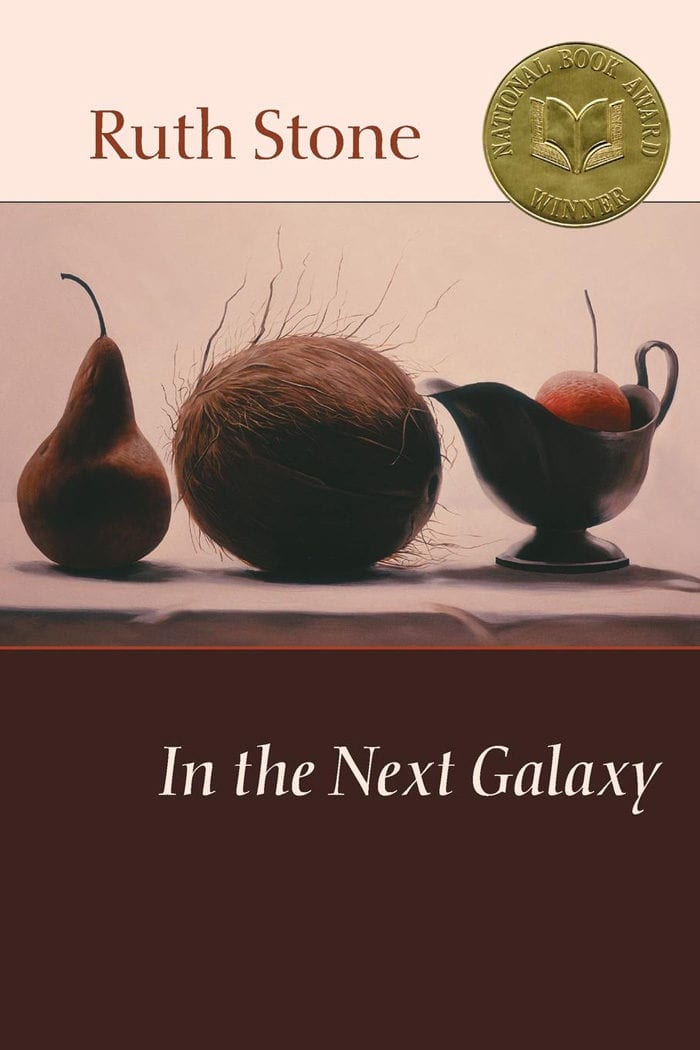
Winner of the National Book Award, In the Next Galaxy is Ruth Stone’s eighth collection. The judges commented, “At an age when many are merely repeating themselves, Ruth Stone has taken on new themes and images, created with both a seer’s eye and the eye of social witness. Of remembered love, loss, and poverty, she writes with such a force of intelligence and compassionate dispassion that even the most humble, commonplace things inhabit a world made strange, lucid, luminous. In the Next Galaxy gives us the unflinching vision of a woman well into her eighties, fully inhabiting body and mind, writing poems that are vital and eloquent distillations of experience.” Ruth Stone is a storyteller, writing with a crackling intelligence from the vantage point of an aging and impoverished woman. Wise, sardonic, crafty, and misleadingly simple, Stone loves heavy themes but not heavy poems.
ISBN: 9781556592072
Format: Paperback
ISBN: 9781556591785
Format: Hardcover
Reviews
“It’s a marvelous tribute to love and survival, with Stone as, in her words, ‘the simple who rose up and lived.'” —New York Times Book Review
“Stone’s lifetime of craft permits her to pare down both description and meditation and, at her best, make startling use of short, slow lines and of occasional rhyme; standout lyric work like ‘Train Ride’ or ‘At Eighty-Three She Lives Alone’ recalls at once Stanley Kunitz and Kay Ryan, and should find a place in many anthologies.” —Publishers Weekly
“Stone writes conversationally, with lyricism, honesty, wit, and plenty of focus on the passage of time. Her uses of subtle and occasional rhyme, off-rhyme, and inner rhyme are delicate and always appropriate. Highly recommended.” —Library Journal
“Compassionate, comic, feminist and horrified by injustice, Stone’s poems are composed with an accessible deftness.” —Oregonian
“Stone’s poems, always moving, can be lovely or starkly exposing. Her language is scalpel-sharp, with never a wasted syllable. This book should win the Pulitzer Prize, National Book Award, and every other available honor. Ruth Stone is certain to be known, read and honored by future generations along with a very small contingent of great poets at work in the world today.” —Peter Aaron, Elliott Bay Book Company
“Earthy and harrowing, while also deeply personal, purposeful, and timely; her work charts poet and reader through the ups and downs of life.” —Christian Science Monitor
“Like the great Russian modernists, her phrasing is declarative, succinct, self-contained but filled with emotional power. Now at 83, she is losing her eyesight, but her poetic vision is keener than ever.” —Los Angeles Times
“To read the 85 short poems assembled here is to cheat time, so attentively does Stone compress moments and memories into imagery… Perhaps one day Stone’s wild dreams of a better world will come true. For the meantime, though, she seems content to sing the virtues of this fallen world, finding beauty in sleepy winter towns and the forgotten souls who people their bus stations.” —Seattle Times
“Into her old age, Stone has remained one of our most piquant and durable poets.” —Ruminator Review
“It’s… inspiring—indeed, electrifying—that Ruth Stone is producing astonishing work in her mid-eighties, and that her sheer brilliance has finally begun to gain the recognition it’s long deserved.” —Poetry
“They are at once clear-headed and elegant, graced with varying recurrences of sound that give them a kind of music.” —Virginia Quarterly Review
“Her poems startle us over and over with their shapeliness, their humor, their youthfulness, their wild aptness, their strangeness, their sudden familiarity, the authority of their insights, the moral gulps they prompt, their fierce exactness of language and memory.” —Galway Kinnell, head judge for the 2002 Wallace Stevens Award
Awards
National Book Award, 2002
Wallace Stevens Award, 2002
